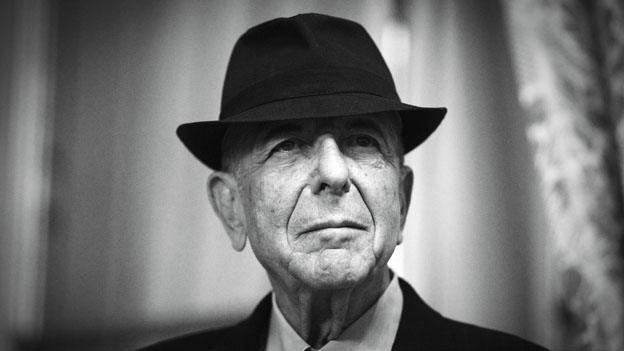Obituary: Leonard Cohen
- Published

Leonard Cohen was called "the high priest of pathos" and the "godfather of gloom".
But the influence and appeal of this poet, novelist, songwriter and legendary ladies' man has endured throughout his career.
Often prone to depression, his witty, charming and self-deprecating manner - not to mention his black humour - was reflected in his lyrics.
And after a period of retreat in the 1990s he remerged with his creativity undimmed.
Leonard Norman Cohen was born in Westmount, a well-to-do area of Montreal, on 21 September 1934.
His mother had emigrated from Lithuania to Canada and his father Nathan, whose ancestors came from Poland, owned a prosperous clothing store.
His father died when Cohen was just nine years old but left his son a trust fund that would enable him to pursue his chosen literary career.
The young Cohen attended a privately run Jewish co-educational day school where he learned to play guitar and formed a folk group called the Buckskin Boys. "Guitars impress girls", was the reasoning he gave.
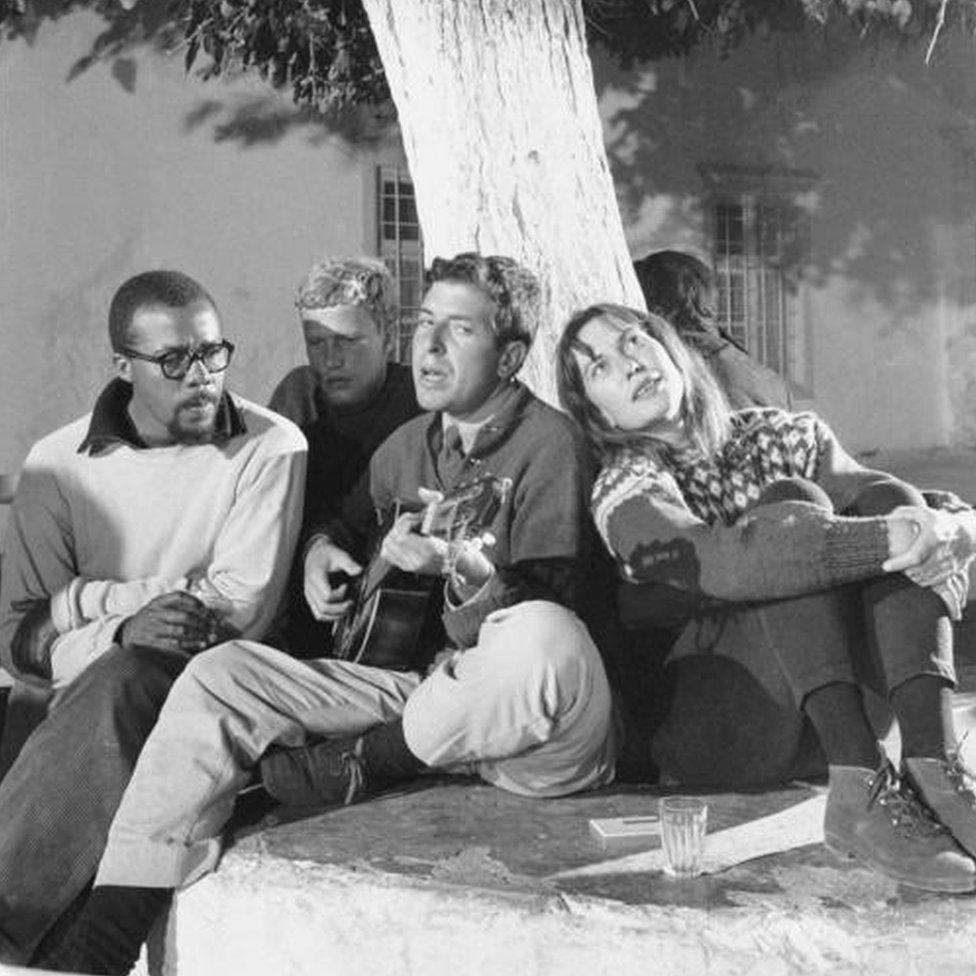
The Greek island of Hydra inspired his first novel
In 1951 he enrolled at Montreal's McGill University to study English Literature, and published his first collection of poetry, Let Us Compare Mythologies, in 1956.
His poetry was well-received and after a year at Columbia University in New York he turned to writing full-time producing his second collection of poems, entitled The Spice Box of Earth, in 1961 when he was 27.
The volume established Cohen's reputation as a serious poet and became his most popular work. The poem, You Have the Lovers, captured his fascination with human relationships.
He used the royalties from the book, along with literary grants from the Canadian government, to travel around the world, sampling what it had to offer - including some use of LSD when it was still legal.
After a spell in London, where his first purchases were an Olivetti typewriter and a blue raincoat, he moved to the small Greek island of Hydra, publishing his first novel The Favourite Game in 1963.
He lived there with Norwegian Marianne Jensen, for whom he later wrote So Long Marianne. Her death in early 2016 inspired Cohen's final album, You Want It Darker, released just three weeks ago.
'Cult classic'
Beautiful Losers, Cohen's second novel, was published in 1966, and was the last of his writing before he quit Hydra to move to the United States.
It prompted the Boston Globe to declare: "James Joyce is not dead. He is living in Montreal under the name of Cohen."
But the writer had already decided to move to New York and pursue a career as a songwriter and musician.
His debut album, Songs of Leonard Cohen, was released in December 1967. With its funereal tone, and Cohen's weary intonation, it was by no means a commercial success but it turned into something of a cult classic for folk buffs, and artists rushed to cover songs like Suzanne.
Among them was Judy Collins, who turned the song - based on Cohen's poem Suzanne Takes You Down - into a hit.
Over the next seven years he recorded three more albums: Songs From a Room, Songs of Love and Hate and New Skin for the Old Ceremony, which featured Chelsea Hotel - an account of Cohen's sexual encounter with singer Janis Joplin.
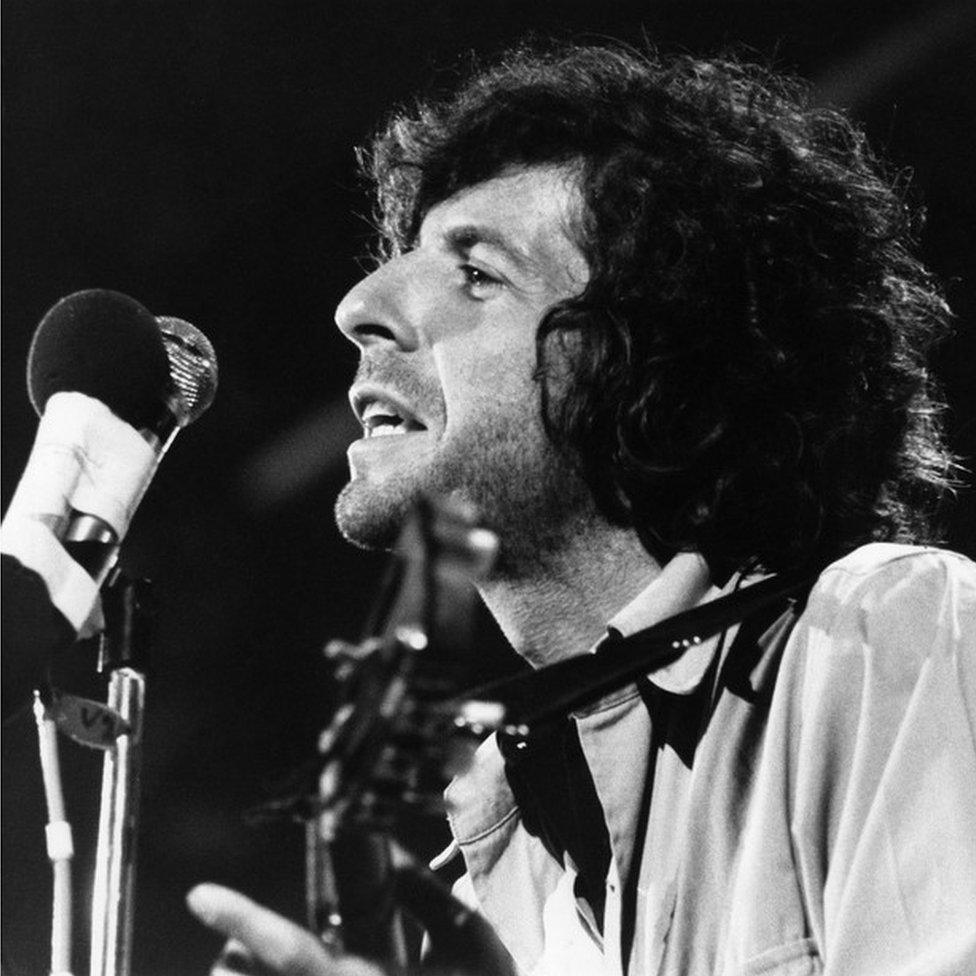
He wowed the crowd on the Isle of Wight in 1970
Despite a paralysing fear of playing live, he toured these albums extensively around the world. Those concerts included a remarkable appearance at a highly-charged Isle of Wight Festival in 1970.
The crowd was volatile and Cohen was following an electrifying performance by Jimi Hendrix, but the quiet folk singer won them over by telling a hushed anecdote about childhood trips to the circus.
"There was one thing at the circus that happened that I always used to wait for," he told the audience of 600,000.
"I don't want to impose on you, this isn't like a sing-along… but there was one moment when a man would stand up and say, 'Would everybody light a match so we can locate one another?'
"Could I ask you, each person, to light a match, so that I could see where you all are? Could each of you light a match, so that you'll sparkle like fireflies, each at your different heights? I would love to see those matches flare."
The intimate anecdote, and Cohen's subsequent performance are remembered as one of the defining moments of the whole festival.
'Perfect and broken'
In 1973, Cohen went to Israel to volunteer for active service in the Yom Kippur war. Instead he was assigned to entertain troops in a tank division where he once found himself coming under fire in the Sinai desert.
The recording of his fifth album, Death of a Ladies' Man, descended into near farce. Cohen clashed with the unstable producer, Phil Spector, whose "wall of sound" technique was at odds with Cohen's quiet acoustic based music. The resulting album was not a success, and he later disowned it.
Cohen's music fell out of favour in the late 1970s and early 1980s, but interest revived in 1985 with the release of the album Various Positions. This featured the track Hallelujah, which had taken the musician five years to write.
A mournful ballad, it touches on themes of love, sex, religion, longing and regret. Cohen said it explained "that many kinds of hallelujahs do exist, and all the perfect and broken hallelujahs have equal value".
Hated by his record company, it later became the most-covered Cohen song of all time. Jeff Buckley's haunting, melodic version in 1994 became the standard interpretation - but it only received mainstream recognition when Rufus Wainwright sang it for the animated film Shrek in 2001.
Various Positions was modestly successful, but the singer seemed confined to a small, committed audience until his backing singer Jennifer Warnes released Famous Blue Raincoat, an album of material authored by Cohen, in 1987.
It sold extremely well and introduced Cohen to a new generation of listeners. When the pair collaborated on 1988's eminently accessible album I'm Your Man, the result was his biggest album in a decade.
The record paired cynical commentaries such as First We take Manhattan, with beautiful songs of love like the title track and Take This Waltz.
In 1991 a tribute album, I'm Your Fan, a collection of his songs covered by artistes such as REM, The Pixies and John Cale, again pushed Leonard Cohen back into the limelight.
However, by this time, Cohen had begun spending time at a Buddhist retreat in California and eventually moved there to become a Buddhist monk in 1996.
He finally emerged in 1999 with a wealth of new material, some of which featured on his 2001 album, aptly titled Ten New Songs.
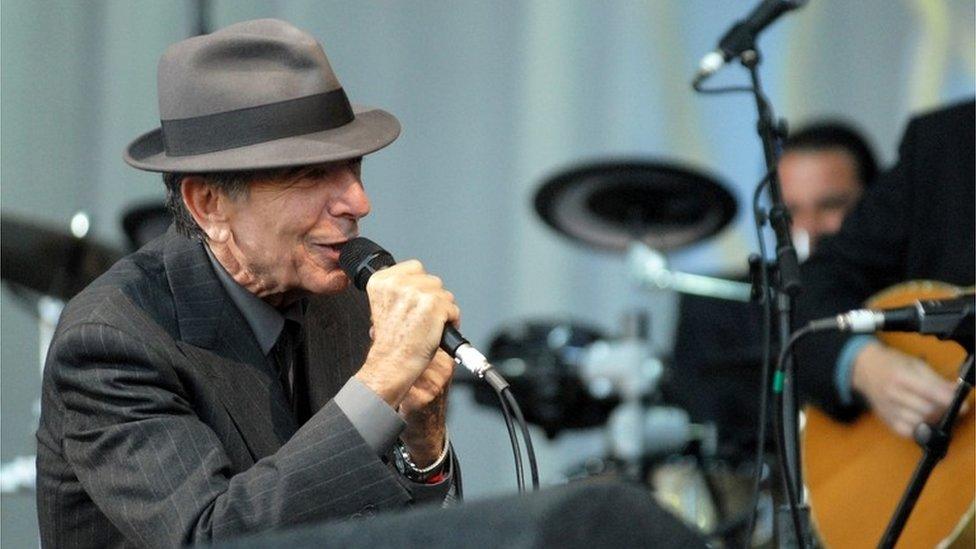
Glastonbury was the highlight of his 2008 tour
Co-written with the producer and vocalist, Sharon Robinson, who also played all the instruments, it saw Cohen in introspective and relaxed mood, but perhaps contemplating mortality with lyrics such as, "the night is getting colder".
In 2006 Cohen, at the age of 73, was obliged to return to touring when he claimed that his manager (and former lover) Kelley Lynch had embezzled more than $5m from his account.
Despite winning a court case against her, and being awarded huge damages, she failed to pay back any of the money. Lynch would later be jailed after violating a court order to keep away from Cohen.
Two years later, he embarked on a marathon concert tour in 2008 which ran for 18 months and included a performance on the Pyramid stage at Glastonbury - which was seen by many as the highlight of the festival.
2012 saw the release of Old Ideas, which became his highest charting album of all time. Many critics saw the songs on the album as an intimation of his own mortality. However, despite his advancing years, Cohen set off on a world tour to promote the album.
When the Grand Tour ended in December 2013, Cohen largely vanished from the public eye - but he continued to write.
'Swansong'
Just last month, he released You Want It Darker, produced by his son Adam. Severe back issues made it difficult for Cohen to leave his home, so Adam placed a microphone on his dining room table and recorded him on a laptop.
Like David Bowie's Blackstar, the record felt like a swansong. "I'm leaving the table / I'm out of the game," he lamented on Leaving The Table.
The album received positive reviews, but a New Yorker interview, external tied to the release revealed Cohen making peace with mortality.
"I am ready to die," he said. "I hope it's not too uncomfortable. That's about it for me."
Cohen was, arguably, one of the most enigmatic poets and songwriters of his generation. While many of the themes in his work hinted at depression, he always felt that he was just a keen observer of the realities of life.
"Seriousness, rather than depression is, I think, the characteristic of my work," he once told an interviewer.
"I like a good laugh, but I think there's enjoyment that comes through seriousness. We all know when we close the door and come into your room and you're left with your heart and your emotions, it isn't all that funny."

Follow us on Twitter @BBCNewsEnts, external, on Instagram at bbcnewsents, external, or if you have a story suggestion email entertainment.news@bbc.co.uk, external.

- Published11 November 2016
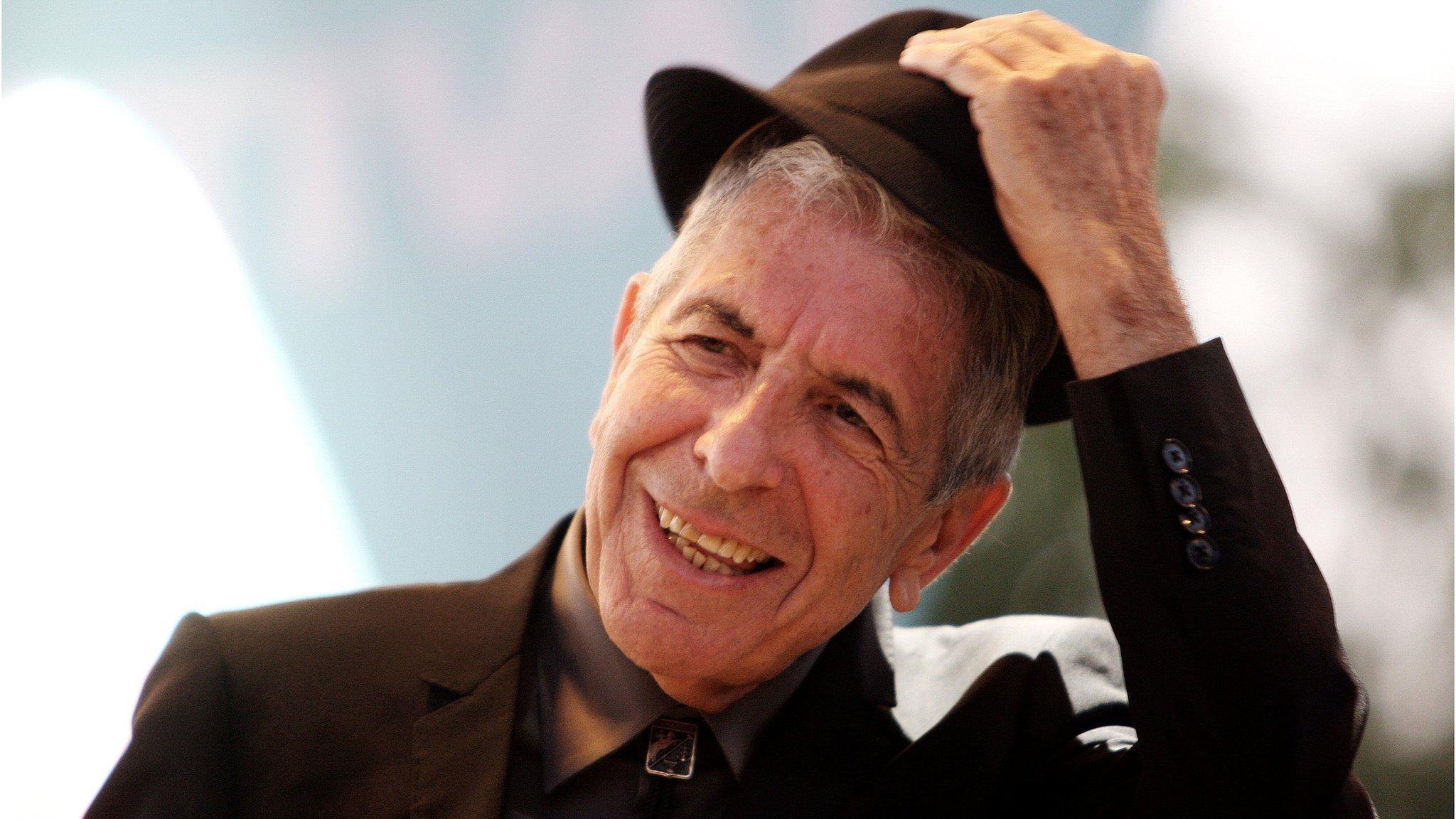
- Published11 November 2016
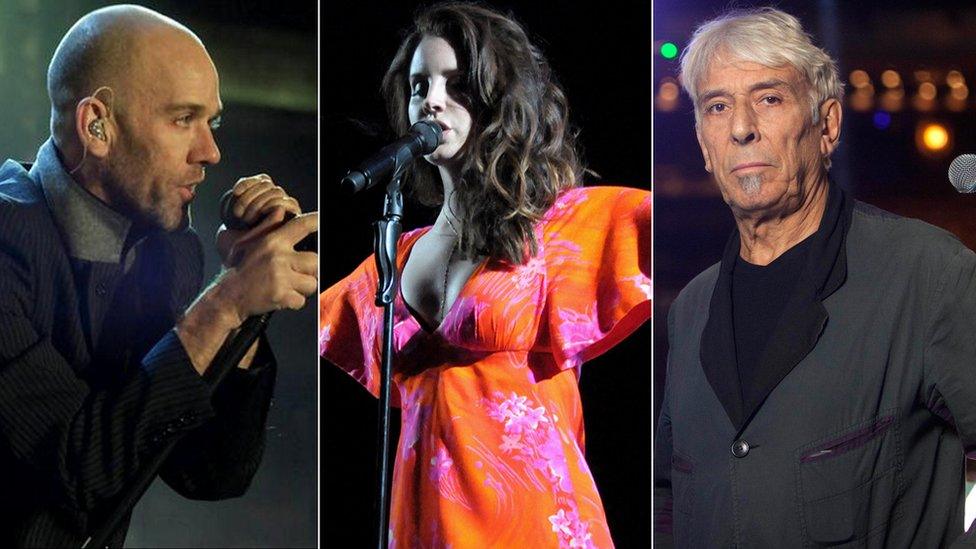
- Published11 November 2016
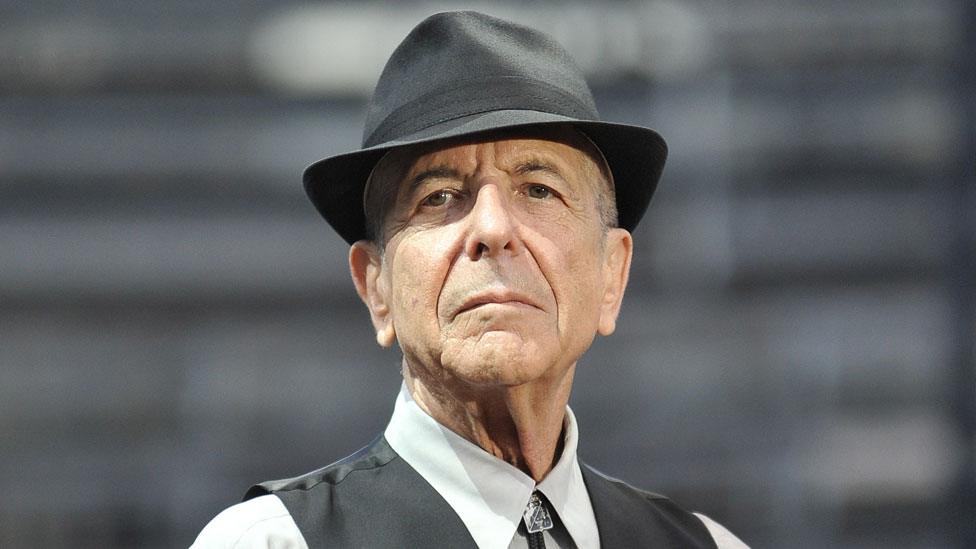
- Published11 November 2016
- Published20 December 2012
